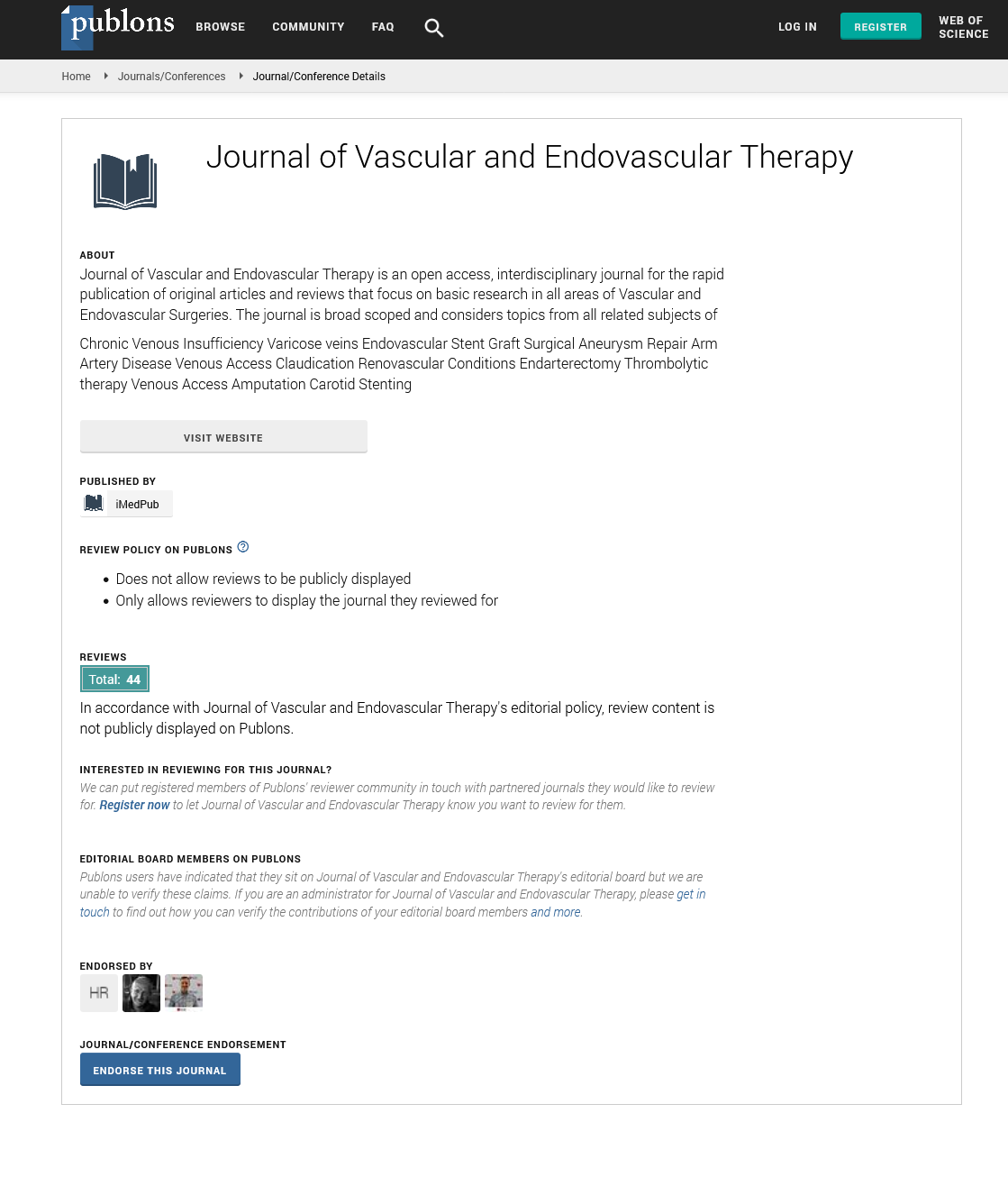ISSN : 2634-7156
Journal of Vascular and Endovascular Therapy
Good results of management of varicose veins through endoscopic assisted surgery
3rd Edition of World Congress & Exhibition on Vascular Surgery
May 24-25, 2018 London, UK
Sin Daw Lin
Kaohsiung Medical University Hospital, Taiwan Kaohsiung Municipal Siaogang Hospital, Taiwan
ScientificTracks Abstracts: J Vasc Endovasc Therapy
DOI: 10.21767/2573-4482-C1-002
Abstract
Aim: The recurrence rate of management of varicose veins was high and ranged 20–60% in previous reports. In this study, primary varicose veins were managed through endoscopic assisted surgery. The recurrence rate and satisfaction rate were evaluated. Materials & Methods: From 1997 to 2017, 1966 limbs of primary varicose veins and its complications were managed through endoscopic assisted surgery. With good illumination and magnified view offered by the endoscopy, tissues in the operative field were visualized clearly. The varicose main trunk and its tributaries, incompetent perforating veins, non-varicose veins and saphenous nerve could be identified by their anatomic appearance. The features of varicose veins explored include: 1) poor contractility of varicose veins; 2) dilated, tortous and flaccid changes of varicose veins and 3) saccular or lateral buldging deformities of vein wall. The anatomic abnormalities were supernumerary tributaries along the main trunk, varicose clusters formed by main trunk, tributaries and/or incompetent perforating vein; variable size and location of incompetent perforating veins. The complicated abnormality of these varicose veins could be carefully dissected and radically excised. The operation procedures will be demonstrated in a video. Because all the abnormal varicose veins and incompetent perforating veins radically excised, and the recurrence rate marked is decreased. Results: The recurrence rate ranged from 0 to 2.3% in our serial reports. The satisfaction rate of 689 patients (2004-2013) was 96.5%. Conclusion: In management of primary varicose vein, endoscopic assisted surgery could achieve a low recurrence rate and high satisfaction rate. Recent Publications 1. Lin Y N, Hsieh T Y, Huang S H, Liu C M, Chang K P and Lin S D (2017) Management of venous ulcers according to their anatomical relationship with varicose veins. Phlebology 33(1):44-52.
2. Kuo C J, Liang S S, Hsi E, Chiou S H and Lin S D (2013) Quantitative proteomics analysis of varicose veins: identification of a set of differentially expressed proteins related to ATP generation and utilization. Kaohsiung J Med Sci 29(11):594-605. 3. Lin Y N, Lin S D, Huang S H, Lee S H, Lai C S and Chang K P (2012). Endoscopic assisted surgical management of superficial thrombophlebitis in patients with primary varicose veins. J Taiwan Soc of Plast Surg 21(2):90-8. 4. Chang M Y, Chiang P T, Chung Y C, Ho S Y, Lin S D, Lin S R and Neoh C A (2009) Apoptosis and angiogenesis in varicose veins using gene expression profiling. Fooyin J Health Sci 1(2):85-91. 5. Wang Chen H, Lin S D, Lee S S, Chang K P, Sun I F, Wang W H and Lai C S (2008) Management of primary varicose veins with the assistance of endoscopic surgery: it’s role in the treatment of venous ulceration. J Plast Surg Assoc ROC 17(2):127-37.
Biography
Sin Daw Lin performs endoscopic face lifting for facial rejuvenation and expands the endoscopic surgery to manage the benign tumor of the head and neck. He also manages the varicose veins with the assistance of endoscopic surgery to decrease the recurrence rate. He performed immediate breast re construction with pedicled transverse rectus abdominis myocutaneous flap in over 1230 cases since 1997. Recently, his research team, have established a core laboratory for the study of human adipose derived stem cells (hADSCs). They have developed a new culture medium for rapid proliferation of hADSCs and can harvest a large number of stem cells within a short period.
By tissue engineering, they have succeeded the production of new adipose tissue from hADSCs in immune-deficient mice. He expects in the near future they can reconstruct soft tissue defect with autologous adipose tissue by tissue engineering. Email:sidalin@kmu.edu.tw
Google Scholar citation report
Citations : 177
Journal of Vascular and Endovascular Therapy received 177 citations as per Google Scholar report
Journal of Vascular and Endovascular Therapy peer review process verified at publons
Abstracted/Indexed in
- Google Scholar
- Open J Gate
- Publons
- Geneva Foundation for Medical Education and Research
- Secret Search Engine Labs
Open Access Journals
- Aquaculture & Veterinary Science
- Chemistry & Chemical Sciences
- Clinical Sciences
- Engineering
- General Science
- Genetics & Molecular Biology
- Health Care & Nursing
- Immunology & Microbiology
- Materials Science
- Mathematics & Physics
- Medical Sciences
- Neurology & Psychiatry
- Oncology & Cancer Science
- Pharmaceutical Sciences
